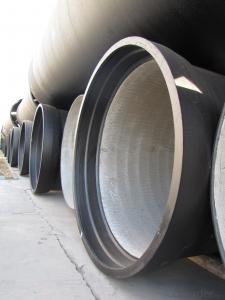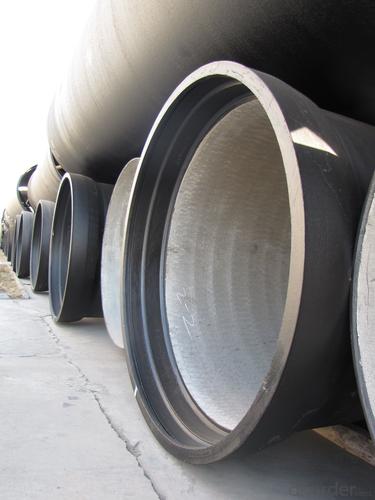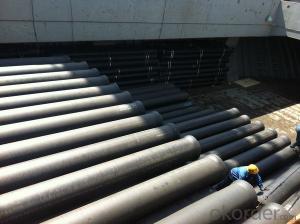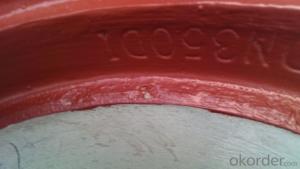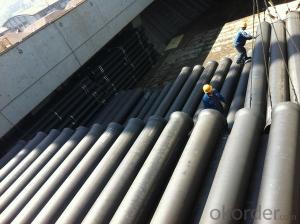T Type Ductile Iron Pipe DN1800 socket spigot pipe
- Loading Port:
- Tianjin
- Payment Terms:
- TT OR LC
- Min Order Qty:
- 10 m
- Supply Capability:
- 30000 m/month
OKorder Service Pledge
OKorder Financial Service
You Might Also Like
1) The standard of pipe: ISO2531:1998, EN545:2006,K9 K8
2) Effective length: 6m/5.7m
3) Inner cement line: Portland cement lineas per ISO4179
4) Zinc coating: at least 130g/m2 as per ISO8179
5) Bitumen painting: at least 70μm as per ISO8179
6)With 102% quantity of NBR, SBR, or EPDM ring asper ISO4633
7) DN80-DN1200
8) Highstrength, lighter than grey iron, good corrosion resistance, no furring, smallflow resistance, easy fixing, long life tome about 100 yeas
9)Checked by automatic inspection equipment
10) Composition:
Chemical composition | |||
Chemical composition | Ductile Cast Iron Pipe (%) | Grey iron pipe (%) | Steel pipe (%) |
C | 3.5-4.0 | 3.2-3.8 | 0.1-0.2 |
Si | 1.9-2.6 | 1.4-2.2 | 0.15-0.4 |
Mn | 0.15-0.45 | 0.4-0.6 | 0.3-0.6 |
P | ≤0.06 | ≤0.3 | 0.02-0.03 |
S | ≤0.02 | ≤0.1 | 0.02-0.03 |
Mg | 0.03-0.06 |
|
|
11) Feature:
Mechanical properties | |||
| Ductile Cast Iron Pipe | Grey Iron Pipe | Steel Pipe |
Tensile Strength(Mpa) | ≥420 | 150-260 | ≥400 |
Yield Strength(Mpa) | ≥300 | No Confirmation | No Confirmation |
Bending Strength(Mpa) | ≥590 | 200-360 | ≥400 |
Elongation (%) | ≥10 | Neglected | ≥18 |
Brinell Hardness(HBS) | ≤230 | ≤230 | About 140 |
12) T type mechanical joint
13) Packing: in bulk or container
PACKING: 1) Pipesare bundled together with the steel belt.
2) Wooden pieces are put between the pipes.
- Q: How is ductile iron pipe different from cast iron pipe?
- Ductile iron pipe and cast iron pipe are both commonly used for various plumbing and drainage applications. However, they differ in terms of their composition, strength, and flexibility. Firstly, ductile iron pipe is made from a different type of iron alloy compared to cast iron pipe. Ductile iron contains a higher percentage of carbon and silicon, which gives it enhanced strength and durability. On the other hand, cast iron pipe is made from gray iron, which has a higher carbon content but lacks the flexibility of ductile iron. Secondly, ductile iron pipe is known for its superior strength and impact resistance. It can withstand higher pressures and is less prone to cracking or breaking under heavy loads or external forces. Cast iron pipe, while strong, is more brittle and can be prone to fractures and failures. Another significant difference is the flexibility of ductile iron pipe. It has a greater degree of flexibility and can withstand bending and deformation without breaking. This flexibility allows for easier installation, especially in areas with uneven terrain or where ground movement may occur. In contrast, cast iron pipe is less flexible and more rigid, making it less suitable for certain applications where flexibility is essential. Additionally, ductile iron pipe has a smoother interior surface compared to cast iron pipe. This smoothness reduces friction, improves flow efficiency, and minimizes the accumulation of sediment and deposits within the pipe, resulting in better water flow and reduced maintenance requirements. In summary, ductile iron pipe differs from cast iron pipe in terms of its composition, strength, flexibility, and interior surface smoothness. Ductile iron offers superior strength, impact resistance, and flexibility, making it a preferred choice in various plumbing and drainage applications.
- Q: What are the advantages of using ductile iron pipes?
- There are several advantages of using ductile iron pipes. Firstly, they have high tensile strength and durability, making them resistant to cracking and breaking under pressure or external forces. Secondly, ductile iron pipes have excellent corrosion resistance, allowing them to withstand harsh environments and reducing the risk of leaks and pipe failures. Additionally, they provide better flow characteristics due to their smooth internal surface, ensuring efficient transportation of fluids. Lastly, ductile iron pipes have a long lifespan and require minimal maintenance, resulting in cost savings and reliable infrastructure for water supply and wastewater management systems.
- Q: Can ductile iron pipe be used for water treatment plants?
- Yes, ductile iron pipe can be used for water treatment plants. Ductile iron pipes are known for their strength, durability, and corrosion resistance, making them suitable for transporting water and other fluids in various industrial applications, including water treatment plants.
- Q: Are ductile iron pipes suitable for trenchless installation methods?
- Yes, ductile iron pipes are suitable for trenchless installation methods. They possess the necessary strength and flexibility to withstand the installation process without compromising their structural integrity. Additionally, their corrosion resistance and durability make them a reliable choice for trenchless installations.
- Q: How do ductile iron pipes handle ground movement in earthquake-prone areas?
- In earthquake-prone areas, ductile iron pipes are highly regarded for their exceptional resistance to ground movement. These pipes are specifically designed to endure external forces, including seismic activities and shifting ground. The remarkable flexibility of ductile iron pipes allows them to effectively absorb and distribute the energy generated during ground movement. This flexibility is achieved through the unique composition of ductile iron, which contains nodular graphite in its microstructure. The presence of nodular graphite grants the pipe with ductility and resilience, enabling it to deform under stress without breaking. During an earthquake, when the ground begins to shift, ductile iron pipes have the capacity to adapt to the changing conditions. They can elongate, compress, and bend, thereby reducing the likelihood of pipe failure. This characteristic is of utmost importance in earthquake-prone areas, as it helps prevent catastrophic failures and water loss that may occur with more rigid pipe materials. Furthermore, ductile iron pipes possess a high level of joint integrity, further enhancing their ability to withstand ground movement during seismic events. The joints of these pipes are engineered to withstand lateral and angular movement, ensuring their integrity and preventing leaks. In addition to their inherent flexibility, ductile iron pipes are often installed using techniques that enhance their resistance to ground movement. Anchoring systems, such as thrust blocks and restraints, can be employed to secure the pipes and prevent excessive movement. These systems contribute to the stability of the pipeline network and further minimize the potential for damage during earthquakes. Overall, the combination of ductility, joint integrity, and anchoring systems make ductile iron pipes an exceedingly reliable choice for managing ground movement in earthquake-prone areas. They offer a durable and resilient solution that can withstand the challenges posed by seismic activities, guaranteeing a continuous water supply and minimizing the risk of infrastructure damage.
- Q: Are ductile iron pipes suitable for use in saltwater environments?
- Due to their vulnerability to corrosion, ductile iron pipes are generally deemed unsuitable for deployment in saltwater environments. Saltwater, being highly corrosive, can expedite the deterioration of ductile iron pipes. Although ductile iron pipes are known for their strength and durability, they possess a greater susceptibility to corrosion in saltwater when compared to alternative materials such as stainless steel or corrosion-resistant alloys. Consequently, it is advisable to employ materials that are specifically engineered for saltwater environments to guarantee sustained functionality and prevent costly repairs or replacements.
- Q: What are the different pressure ratings available for ductile iron pipe?
- Ductile iron pipe, known for its strength, durability, and resistance to corrosion, finds widespread use in various applications. The pressure ratings of this type of pipe depend on factors like diameter and wall thickness. Typically, ductile iron pipe offers pressure ratings ranging from 150 psi to 350 psi. For pipes with smaller diameters, usually measuring between 3 inches and 24 inches, commonly available pressure ratings include 150 psi, 200 psi, and 250 psi. These ratings suit a broad range of applications, including water distribution systems, sewer lines, and industrial piping. For larger diameter pipes, typically ranging from 30 inches to 64 inches, the usual pressure ratings are 150 psi, 200 psi, 250 psi, and 350 psi. These higher ratings are necessary for transporting larger volumes of water or other fluids across longer distances. It is worth noting that the pressure ratings of ductile iron pipe adhere to industry standards and guidelines. These standards ensure that the pipe can safely withstand both internal pressure and external loads during operation. When choosing the appropriate pressure rating for ductile iron pipe, it is vital to consider factors such as the specific application, flow rates, and expected operating conditions. Seeking advice from industry experts and adhering to local codes and regulations is crucial to ensure the correct selection and installation of ductile iron pipe for a particular project.
- Q: Are ductile iron pipes available in different wall thicknesses?
- Yes, ductile iron pipes are available in different wall thicknesses. Ductile iron pipes are manufactured with various wall thicknesses to meet different requirements and applications. The wall thickness of a ductile iron pipe is determined based on factors such as the pipe's diameter, the internal pressure it needs to withstand, and the soil conditions it will be installed in. Pipes with thicker walls are typically used for higher pressure applications or in areas with more challenging soil conditions, while thinner-walled pipes may be suitable for lower pressure applications. The availability of different wall thicknesses allows for flexibility in selecting the appropriate ductile iron pipe for specific projects and ensures that the pipes can efficiently and safely transport fluids or gases.
- Q: Can ductile iron pipes be used for water treatment plants?
- Yes, ductile iron pipes can be used for water treatment plants. Ductile iron pipes have excellent corrosion resistance and durability, making them suitable for transporting water in water treatment plants. Additionally, their high tensile strength allows them to withstand the high pressures often found in these facilities.
- Q: Are ductile iron pipes suitable for installation in areas with high soil settlement and consolidation?
- Ductile iron pipes are generally considered suitable for installation in areas with high soil settlement and consolidation. One of the key advantages of ductile iron pipes is their ability to withstand external loads and accommodate ground movement. Ductile iron pipes are known for their high strength and flexibility, making them more resistant to soil settlement and consolidation compared to other pipe materials. They have a higher tensile strength and can withstand heavy loads and ground vibrations without cracking or breaking. This makes them suitable for areas where the soil is prone to settlement and consolidation. Furthermore, ductile iron pipes have a high resistance to corrosion and can withstand aggressive soil conditions, which is often associated with areas prone to settlement and consolidation. They are also less susceptible to damage from external factors such as roots or rocks, which further enhances their suitability for installation in such areas. It is important, however, to consider the specific conditions of the site and consult with engineers or experts familiar with the local soil conditions. Factors such as the magnitude and rate of settlement, soil type, groundwater levels, and construction methods should be taken into account when determining the appropriateness of ductile iron pipes for installation in areas with high soil settlement and consolidation. In conclusion, ductile iron pipes are generally suitable for installation in areas with high soil settlement and consolidation. Their high strength, flexibility, resistance to corrosion, and ability to withstand external loads make them a reliable choice for such conditions. Nonetheless, it is always recommended to assess the specific site conditions and consult with professionals to ensure the most appropriate pipe material is chosen for each project.
Send your message to us
T Type Ductile Iron Pipe DN1800 socket spigot pipe
- Loading Port:
- Tianjin
- Payment Terms:
- TT OR LC
- Min Order Qty:
- 10 m
- Supply Capability:
- 30000 m/month
OKorder Service Pledge
OKorder Financial Service
Similar products
Hot products
Hot Searches
Related keywords
